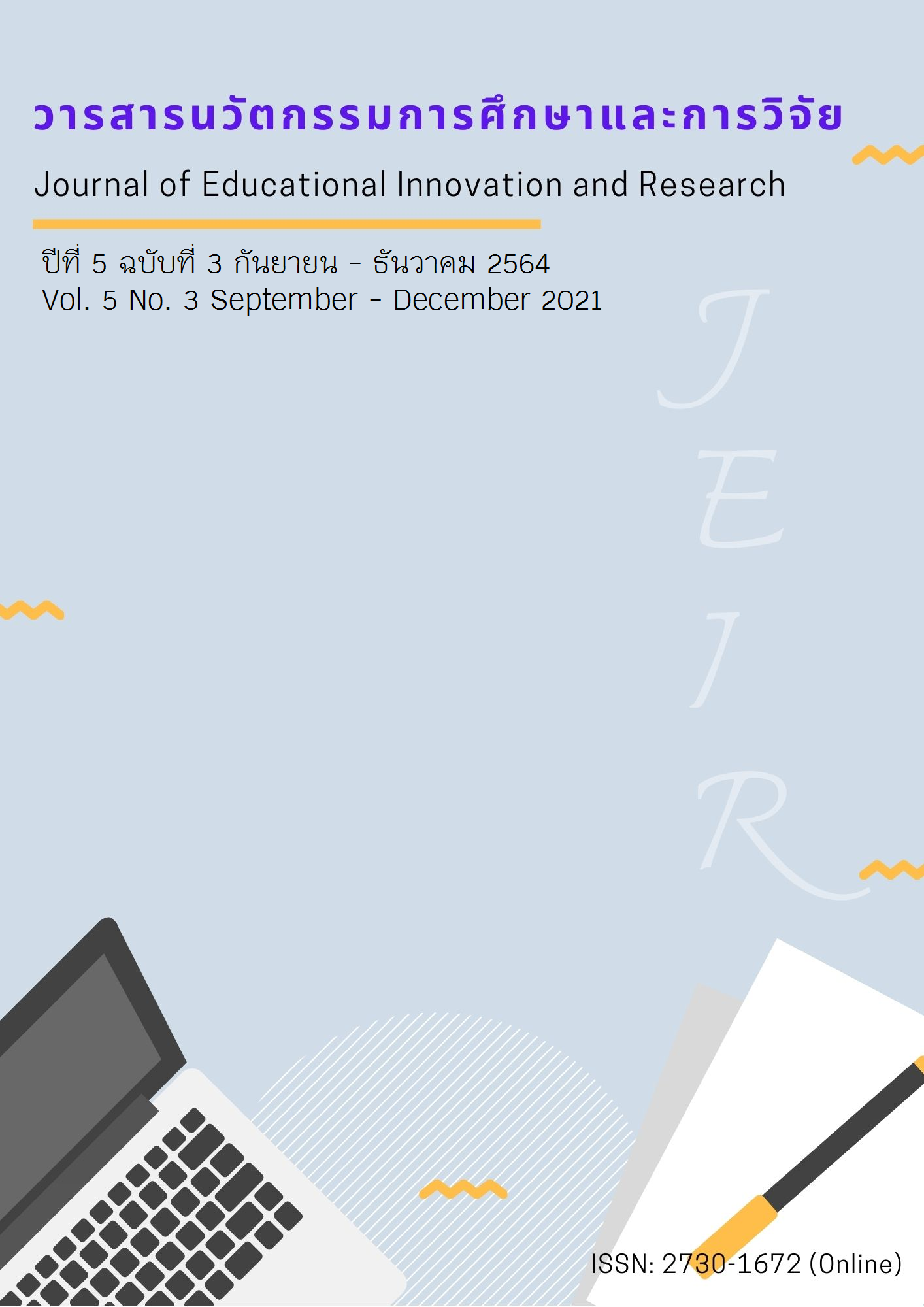กระบวนการเสริมสร้างความจงรักภักดีของบุคลากรในสถานศึกษา
Main Article Content
บทคัดย่อ
ความจงรักภักดีเป็นความรู้สึก และการแสดงออกของบุคลากรซึ่งเคารพต่อสถานศึกษามีความเต็มใจปฏิบัติงานและอุทิศตน มีความผูกพัน มีความรู้สึกเป็นเจ้าของ พยายามเป็นบุคลากรที่ดี มีความต้องการเป็นส่วนหนึ่งขององค์กร สนใจเอาใจใส่ ภูมิใจ และสนับสนุนงานปกป้องสถานศึกษา ตระหนักในด้านดีมีความเชื่อถือและไว้วางใจพร้อมที่จะช่วยเหลืองานทุกเมื่อมีความปรารถนาและมีความตั้งใจที่จะปฏิบัติงานอยู่ในองค์ก่อนต่อไปโดยกระบวนการส่งเสริมความจงรักภักดีต่อสถานศึกษา ได้แก่ 1) ส่งเสริมสร้างจิตสำนึก 2) ส่งเสริมการเป็นบุคลากรที่ดี 3) การสร้างความเป็นน้ำหนึ่งใจเดียวกัน 4) สร้างความสำนึกในหน้าที่ 5) ส่งเสริมความรู้ความสามารถ 6) สร้างขวัญและกำลังใจ เพื่อให้เกิดการจงรักภักดีต่อองค์กรอย่างยั่งยืนต่อไป
Article Details
เอกสารอ้างอิง
จุมพล โพธิสุวรรณ. (2564). พฤติกรรมผู้นำเชิงยุทธศาสตร์. วารสารสหวิทยาการมนุษยศาสตร์และสังคมศาสตร์, 4(1), 135-148.
ชินวัฒน์ ปานมั่งมี. (2563). ภาวะผู้นำเชิงคุณภาพของผู้บริหารกับการดำเนินงานวัฒนธรรมในสถานศึกษาสังกัดสำนักงานเขตพื้นที่การศึกษาประถมศึกษาประจวบคีรีขันธ์ เขต 2. วารสารศิลปการจัดการ, 4(3), 686-699.
ธีรศักดิ์ กำบรรณารักษ์. (2535). เอกสารประกอบการฝึกอบรมหลักสูตรยุทธศาสตร์ในการทำงานให้มีประสิทธิภาพมหาวิทยาลัยธรรมศาสตร์. กรุงเทพฯ: มหาวิทยาธรรมศาสตร์.
นารี หมู่มาก.(2547). ความสัมพันธ์ปัจจัยที่เกี่ยวข้องกับงานกับความผูกพันต่อองค์กรของพนักงานกลุ่ม
ธุรกิจภาษาและคอมพิวเตอร์ในเขตบางเขน กรุงเทพมหานคร (วิทยานิพนธ์บริหารธุรกิจมหาบัณฑิต). บัณฑิตวิทยาลัย: มหาวิทยาลัยราชภัฏพระนคร.
ภูมิภควัธจ์ ภูมพงศ์คชศร. (2563). การบริหารจัดการชั้นเรียนเพื่อพัฒนาทักษะการเรียนรู้ในศตวรรษที่ 21. วารสารสหวิทยาการมนุษยศาสตร์และสังคมศาสตร์, 3(3), 591-600.
รัชนี ตรีสุทธิวงษา. (2552). ความสัมพันธ์ระหว่างความพึงพอใจในการทำงาน ความจงรักภักดีต่อองค์กร และประสิทธิภาพการทำงานของพนักงานมหาวิทยาลัยมหาสารคาม (วิทยานิพนธ์ศิลปศาสตรมหาบัณฑิต). บัณฑิตวิทยาลัย มหาวิทยาลัยมหาสารคาม.
วันใหม่ ทิพโอสถ. (2558). ความจงรักภักดีต่อองค์การของพนักงานบริษัท ชาร์พ แอพพลายแอนซ์ ประเทศไทย จำกัด. วารสารครุศาสตร์อุตสาหกรรม, 14(1), 145-152.
สิริพร มูลเมือง. (2563). คุณภาพชีวิตในการทำงานกับความผูกพันต่อองค์การของบุคลากร สำนักงานเขตสายไหม กรุงเทพมหานคร. วารสารนวัตกรรมการจัดการศึกษาและการวิจัย, 3(1), 29-40.
โสมวลี ชยามฤต. (2564). การพัฒนาทรัพยากรมนุษย์เพื่อรองรับยุคดิจิทัลขององค์การภาครัฐและเอกชน. วารสารสหวิทยาการมนุษยศาสตร์และสังคมศาสตร์, 4(1), 38-50.
Adler. A.N. (1999). A Study of Teachers’ Perceptions of School-Based Management‘s Impact on Teacher Empowerment. Dissertation Abstracts International, 60(11), A-168.
Cooper, J. D. and other. (1979). To What and How of Reading Instruction. (2nd ed.). Ohio: Merill.
Damnoen, P. S. et al. (2021). The Development of Student Characteristics in According to the Nawaluk Framework of the Buddhist integration of Buddhapanya Sri Thawarawadee Buddhist College. Asia Pacific Journal of Religions and Cultures, 5(2), 126-135.
Damnoen, P. S., Phumphongkhochasorn, P., Pornpitchanarong, S., & Nanposri, N. (2021). Development of Strategies for the Use of Innovative Information in Education for Secondary Schools under the Office of the Basic Education Commission in the Eastern Region. Turkish Journal of Physiotherapy and Rehabilitation. 32(3), 20483 – 20490.
Hirschman, A. O. (1970).Exit Voice and Loyalty Reponses to decline in firm’s organizations and states. Cambridge. London: Harvard University Press.
Hoy, W.K. & Richard, R. (1974).Subordinate Loyalty to Immediate Superiors: A Neglected Concept in the Study of Educational Administration. Sociology of Education.
McCarthy, D.G. (1998). Seven Steps to Guarantee Failure. Word Executive’s Disgest. Singapore: Times Printers.
Meyer. J.P. & Allen, N.J. (1997).Commitment in the Workplaces: Theory Research and Application. USA: Sage Publications.
Peter, M.B. & Richard, S. (1962). Formal Organization. San Francisco: Chandler Publishing.
Richard, M.S. (1997). Organizational Effectiveness: A Behavioral View. California: Goodyear Publishing.
Baron, R A. & Greenberg, J. (1995). Behavior Organization. (3rd ed.). New York: Allyn & Bacon.
Songsraboon, R., Thongtao, J., Damnoen, P. S., & Huanjit, P. S. (2021). Course Management Based on Outcome-Based Education (OBE) of Learning by Working in Real Conditions. Turkish Journal of Physiotherapy and Rehabilitation, 32(3), 20491 – 20499.


